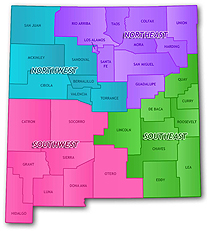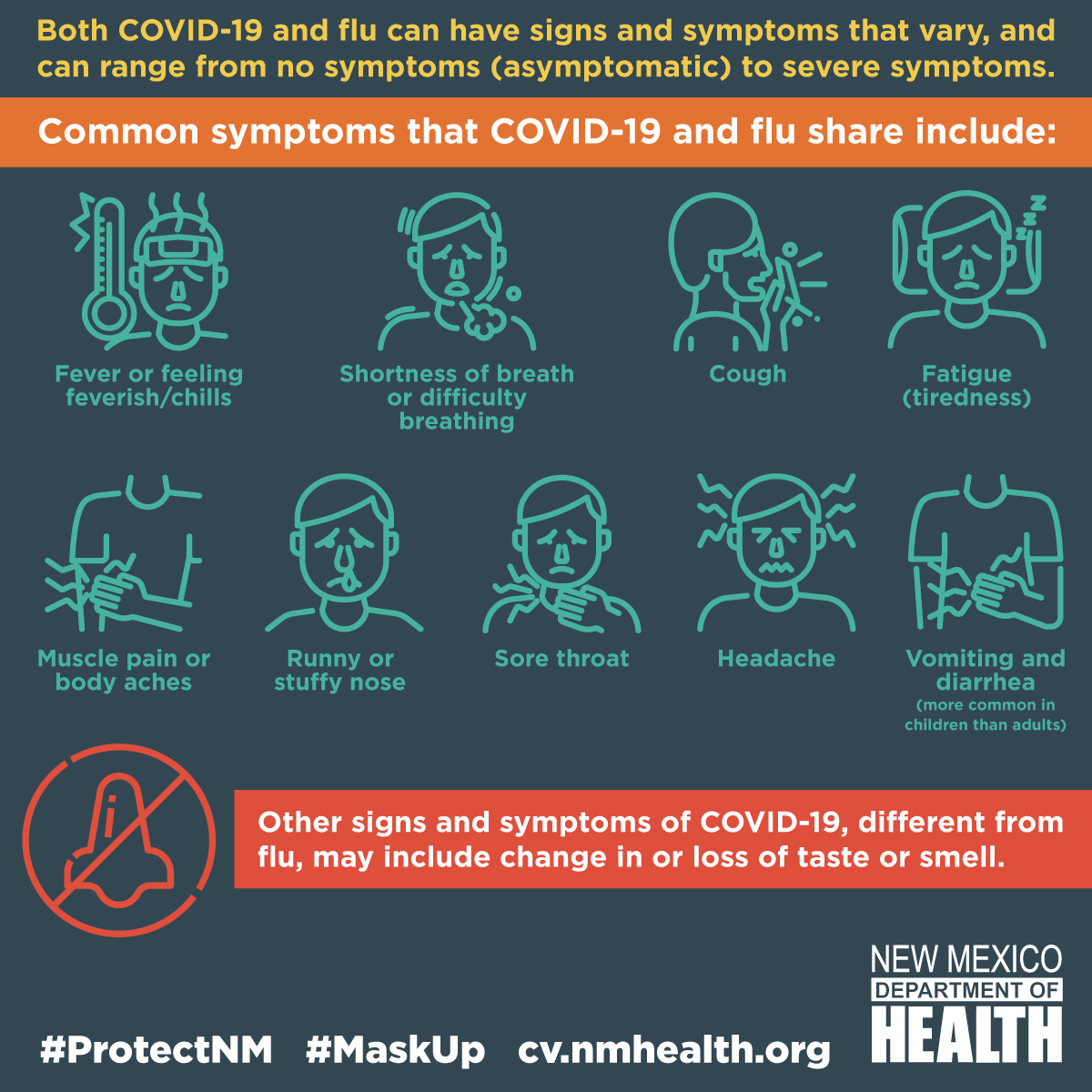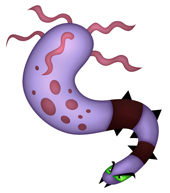Influenza Vaccinations
Table of Contents

Statewide Public Health Offices are still offering Influenza vaccine for children and adults. Contact your local office to schedule an appointment.
Why is it important to get flu vaccine every year?

There are several reasons a new flu vaccine must be made each year. Flu viruses can change from year to year, so the vaccine is updated to protect against the influenza virus strains that are expected to circulate in the U.S. In addition, the protection provided by the flu vaccine a person received in the previous year will diminish over time and may be too low to prevent influenza disease into next year’s flu season.
The vaccine typically changes each year and contains the three flu virus strains. The effectiveness of influenza vaccines varies depending on several factors, such as the age and health of the recipient, the types of circulating influenza viruses, and the degree of similarity between circulating viruses and those included in the vaccine. Getting the flu vaccine annually can help protect against the most harmful complications from influenza, including hospitalization and death.
Basics

Getting the flu feels awful. Sometimes it can even be dangerous and lead to severe illness and complications, including death. The best way to prevent the flu is by getting a flu vaccination each year.
Here’s what you need to do to fight the flu anywhere you go:
What is flu and what are the symptoms?
Flu is a contagious respiratory illness caused by influenza viruses. There are two main types of influenza (flu) virus: Types A and B. The influenza A and B viruses that routinely spread in people (human influenza viruses) are responsible for seasonal flu epidemics each year.
Signs and symptoms include:
- Fever or feeling feverish/chills (usually high, but not everyone with flu will have a fever)
- Headache
- Extreme tiredness
- Dry cough
- Sore throat
- Runny or stuffy nose
- Muscle or body aches
- Stomach symptoms (such as nausea, vomiting, and diarrhea, can also happen, but are more common in children than adults)
How is it different from a cold?
The flu and the common cold are both respiratory illnesses but they are caused by different viruses. The symptoms are very similar, but generally, the flu is worse than the common cold, and symptoms with the flu are more intense. People with colds are more likely to have a runny or stuffy nose. Colds generally do not result in serious health problems, such as pneumonia, bacterial infections, or hospitalizations.
Because people with colds and flu have many of the same symptoms, it can be difficult (or even impossible) to tell the difference between a cold and the flu based on symptoms alone. Special tests that usually must be done within the first few days of illness can be carried out, when needed, to tell if a person has the flu.
Who is most at risk for getting very sick from flu?
- People age 65 and older
- Young children, especially those under 2 years old
- Pregnant women and up to 2 weeks postpartum
- People with chronic health conditions such as asthma, diabetes, and heart disease
- American Indian and Alaska Natives
- Morbidly obese persons
Although these groups are at the highest risk, anyone can become very sick with flu.
What are the complications from the flu?

Most people who get influenza will recover in a few days to less than two weeks, but some people will develop complications (such as pneumonia) as a result of the flu, some of which can be life-threatening and result in death.
Pneumonia, bronchitis, sinus and ear infections are examples of complications from flu. The flu can make chronic health problems worse.
For example, people with asthma may experience more frequent and worse asthma attacks while they have the flu, and people with chronic congestive heart failure may experience worsening of this condition that is triggered by the flu.
How does the flu spread?
Person to Person
People with flu can spread it to others up to about 6 feet away. Most experts think that flu viruses are spread mainly by droplets made when people with flu cough, sneeze, or talk. These droplets can land in the mouths or noses of people who are nearby or possibly be inhaled into the lungs. Less often, a person might also get flu by touching a surface or object that has flu virus on it and then touching their own mouth or nose.
To avoid this, people should stay away from sick people and stay home if sick. It is also important to wash hands often with soap and water. If soap and water are not available, use an alcohol-based hand rub if hands are not visibly soiled. Linens, eating utensils, and dishes belonging to those who are sick should not be shared without washing thoroughly first. Eating utensils can be washed either in a dishwasher or by hand with water and soap and do not need to be cleaned separately. Further, frequently touched surfaces should be cleaned and disinfected at home, work and school, especially if someone is ill.
The Flu is Contagious
Most healthy adults may be able to infect other people beginning one day before symptoms develop and up to five to seven days after becoming sick. Children may pass along the virus for longer than seven days. Symptoms start one to four days after the virus enters the body. That means that you may be able to pass on the flu to someone else before you know you are sick, as well as while you are sick. Some people can be infected with the flu virus but have no symptoms. During this time, those persons may still spread the virus to others.
Prevention
Vaccination
Why should I get a flu shot?

Flu can strike the healthiest of people and make them very sick. Everyone six months of age and older should get flu vaccine every year. While there are many different flu viruses, the seasonal flu vaccine is designed to protect against the top three or four flu viruses that research indicates will cause the most illness during the flu season.
Getting a flu shot helps protect you from getting the flu and prevents you from passing it to people who could get very sick. Vaccinating not only protects ourselves, but also protects the people around us.
Since it takes about two weeks after vaccination for antibodies to develop in the body to protect against influenza virus infection, it’s best to get vaccinated so you are protected before the flu begins spreading in your community.
When should I get a flu shot?
For best protection, flu vaccine is usually given in late summer or early fall before flu season starts. People should begin getting vaccinated soon after flu vaccine becomes available, ideally by the end of October, to ensure that as many people as possible are protected before flu season begins. However, you can get the vaccine anytime during flu season; which typically occurs sometime between October through April.
Who shouldn’t get a flu shot or who should discuss it with their healthcare provider?
Some people should not get a flu vaccine:
- Children younger than 6 months of age
- People with severe, life-threatening allergies to flu vaccine or any ingredient in the vaccine
Some people should talk to their healthcare provider before getting the flu shot:
- People with an allergy to eggs or any of the ingredients in the vaccine.
- People who ever had Guillain-Barré Syndrome.
- People who are not feeling well should talk with their healthcare provider about their symptoms.
Is the vaccine safe?

The most common side effects following flu vaccinations are mild. The most common side effects are soreness, redness, tenderness, or swelling where the flu shot was given.
The CDC and the Food and Drug Administration (FDA) monitor for signs from flu reports that flu vaccines are causing unexpected adverse events and are working with state and local health officials to investigate any unusual events.
Can I get vaccinated and still get the flu?
Yes. It’s possible to get sick with the flu even if you have been vaccinated, although you won’t know for sure unless you get a flu test. It can happen because:
- You may be exposed to a flu virus shortly before getting vaccinated or during the period that it takes the body to gain protection after getting vaccinated. This exposure may result in you becoming ill with flu before the vaccine begins to protect you. (About 2 weeks after vaccination, antibodies that provide protection develop in the body.)
- You may be exposed to a flu virus that is not included in the seasonal flu vaccine. There are many different flu viruses that circulate every year. The flu vaccine is made to protect against the three or four flu viruses that research suggests will be most common.
- Unfortunately, some people can become infected with a flu virus that the flu vaccine is designed to protect against, despite getting vaccinated. Protection provided by flu vaccination can vary widely, based in part on health and age factors of the person getting vaccinated. In general, the flu vaccine works best among healthy younger adults and older children. Some older people and people with certain chronic illnesses may develop less immunity after vaccination. Flu vaccination is not a perfect tool, but it is the best way to protect against flu infection.
Where can I get a flu shot?

Most drug store chains offer flu immunizations, as do most primary care physicians as well as local urgent care facilities.
The New Mexico Department of Health offers vaccinations for people without insurance or who are otherwise not able to get vaccinated. Those with Medicaid or other health insurance should bring their insurance cards with them to the clinic.
For information on locations in your area visit our Public Health Offices page or use the HealthMap Vaccine Finder website.
Good Health Habits for Preventing Seasonal Flu

Avoid close contact.
Avoid close contact with people who are sick. When you are sick, keep your distance from others to protect them from getting sick too.
Stay home when you are sick.
If possible, stay home from work, school, and errands when you are sick. You will help prevent others from catching your illness.
Cover your mouth and nose.
Cover your nose and mouth with a tissue when you cough or sneeze, and throw the tissue in the trash after you use it. If no tissue is available, cough or sneeze into your sleeve/clothing.
Clean your hands.
Wash your hands often with soap and water; if soap and water are not available, and hands are not visibly soiled, use an alcohol-based hand rub.
Avoid touching your eyes, nose or mouth.
Germs are often spread when a person touches something that is contaminated with germs and then touches his or her eyes, nose, or mouth.
Practice other good health habits.
Clean and disinfect frequently touched surfaces and objects that may be contaminated with germs like the flu at home, work or school, especially when someone is ill. Get plenty of sleep, be physically active, manage your stress, drink plenty of fluids, and eat nutritious food.
What should I do if I get the flu?
- Stay home from work or school, and rest.
- Avoid contact with others.
- Rest and drink lots of non-caffeinated fluids and avoid alcohol
- Wash your hands often to protect the people around you.
- Cover your mouth and nose when coughing or sneezing.
- If you are in a high-risk group, see your health care provider and ask if you should be taking antiviral medications.
Go to the doctor or the emergency room if you are having these symptoms:
- Difficulty breathing or shortness of breath
- Pain or pressure in the chest or abdomen
- Sudden dizziness
- Confusion
- Severe or persistent vomiting
- Flu-like symptoms that improve, but return with worse fever and cough
Treatment

Antivirals
There are medications called “antiviral drugs” that treat flu.
Antiviral drugs fight against the flu in your body and you can only get them if you have a prescription from a healthcare provider. Antiviral drugs are different from antibiotics which fight against bacterial infections.
If you have a high risk condition or are in a high risk group and you get flu symptoms, see a healthcare provider as soon as possible because antiviral drugs can prevent serious flu complications, like pneumonia and death. Treatment with an antiviral drug can mean the difference between having milder illness instead of very serious illness that could result in a hospital stay. Studies show that flu antiviral drugs work best when they are started early, within 2 days of getting sick if possible.
A flu vaccine is still the best way to prevent influenza, and antiviral drugs are a very important second line of defense to treat the flu if you get sick.
Taking Care of Yourself: Who is at High Risk for Severe Disease and Complications?
The following are health and age factors that increase a person’s risk of getting serious complications from the flu, including death:
- Asthma
- Neurological and neurodevelopmental conditions
- Blood disorders (such as sickle cell disease)
- Chronic lung disease (such as COPD and cystic fibrosis)
- Endocrine disorders (such as diabetes mellitus)
- Heart disease (such as congenital heart disease, congestive heart failure and coronary artery disease)
- Kidney disorders
- Liver disorders
- Metabolic disorders (such as inherited metabolic disorders and mitochondrial disorders)
- Morbid obesity (body mass index also called BMI of 40 or higher)
- People younger than 19 years of age on long-term aspirin therapy
- Weakened immune system due to disease or medication (such as people with HIV or AIDS, or cancer, or those on chronic steroids)
Other people at high risk from the flu:
- Adults 65 years and older
- Children younger than five years old, but especially children younger than two years old
- Pregnant women and women up to two weeks after the end of pregnancy
- American Indians and Alaska Natives
What happens if I get the flu while pregnant?

Changes to your immune system during pregnancy can make you more sensitive to the flu. This can result in serious problems for your unborn baby, including premature labor and delivery. Additionally, fever in early pregnancy can lead to birth defects.
If you get flu-like symptoms, contact your health care provider immediately. If necessary, your health care provider will prescribe an antiviral medicine to treat you.
For more information, visit the Pregnancy and Flu Information page.
Health Professionals, Schools, & Children
Health Care Personnel

The Centers for Disease Control and Prevention (CDC), the Advisory Committee on Immunization Practices (ACIP), and the Healthcare Infection Control Practices Advisory Committee (HICPAC) recommend that all US health care personnel get vaccinated annually against the flu.
Health care personnel include (but are not limited to) physicians, nurses, nursing assistants, therapists, technicians, emergency medical service personnel, dental personnel, pharmacists, laboratory personnel, autopsy personnel, students and trainees, contractual staff not employed by the health care facility, and persons (e.g., clerical, dietary, housekeeping, laundry, security, maintenance, administrative, billing, and volunteers) not directly involved in patient care but potentially exposed to infectious agents that can be transmitted to and from health care personnel and patients.
For infection control tips for health care providers visit the Influenza Vaccination Information for Health Care Workers and Ask the Experts: Diseases & Vaccines pages.
Schools & Childcare Providers

The Centers for Disease Control and Prevention (CDC) report that each year, an average of 20,000 children under the age of 5 are hospitalized because of flu-related complications. Flu causes more hospitalizations among young children than any other vaccine-preventable disease. The single best way to protect against seasonal flu and its potential severe complications is for children to get a seasonal influenza vaccine each year. Flu vaccination is recommended for all children aged 6 months and older. Making healthy choices at school and at home can help prevent the flu and spreading flu to others.
For infection control tips for schools and childcare providers, visit the Information for Schools & Childcare Providers page.
Isolation Precaution Guidance for NM EMS, Fire, and Law Enforcement
- If signs or symptoms of acute febrile respiratory illness are not present, proceed with normal EMS care with standard precautions.
- If the patient exhibits signs and symptoms of an acute febrile respiratory illness, standard precautions (hand hygiene plus gloves, gown, face shield/eye protection as indicated by patient care activities and risk of exposure to blood/body fluids) PLUS droplet precautions (surgical mask) should be used for all direct patient care activities.
Aerosol-generating procedures:
- When medically essential, all EMS personnel engaged in aerosol generating activities (e.g., endotracheal intubation or placement of supraglottic airways, cardiac pulmonary resuscitation) should utilize fit-tested disposable N95 masks OR powered air purifying respirator (PAPR), disposable non-sterile gloves, eye protection (e.g., goggles, eye shields), and gown.
Consult with your medical director regarding modifications or changes to treatment protocol/guidelines that may be required.
Infection Control Precautions During Transport
- Place a surgical mask on the patient. If this is not possible, have the patient cover mouth/nose with tissue when coughing or use another practical method to contain cough Note: Small facemasks are available that can be worn by children, but it may be problematic for children to wear them correctly and consistently. No facemasks or respirators have been cleared by the FDA specifically for use by children.
- If you transport the patient with acute febrile respiratory illness, keep the windows of your vehicle open (if feasible) and set the heating and air-conditioning systems on a non-recirculating cycle.
- Notify the receiving healthcare facility so that appropriate infection control precautions may be taken prior to patient arrival.
For further information, refer to the CDC Influenza webpage.
Surveillance
For current information on influenza in New Mexico, please visit the Influenza Surveillance Program section of our website.

